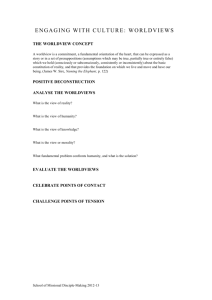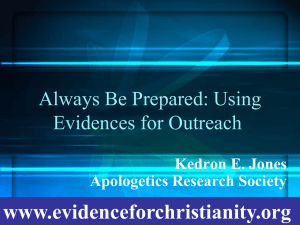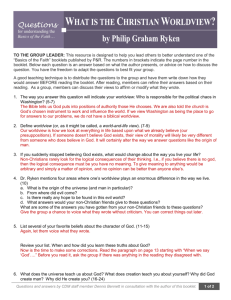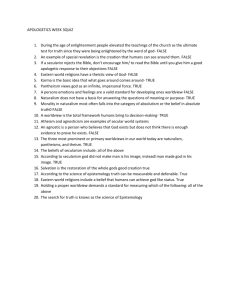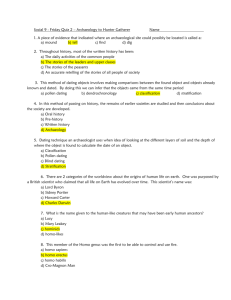rational philosophy
advertisement
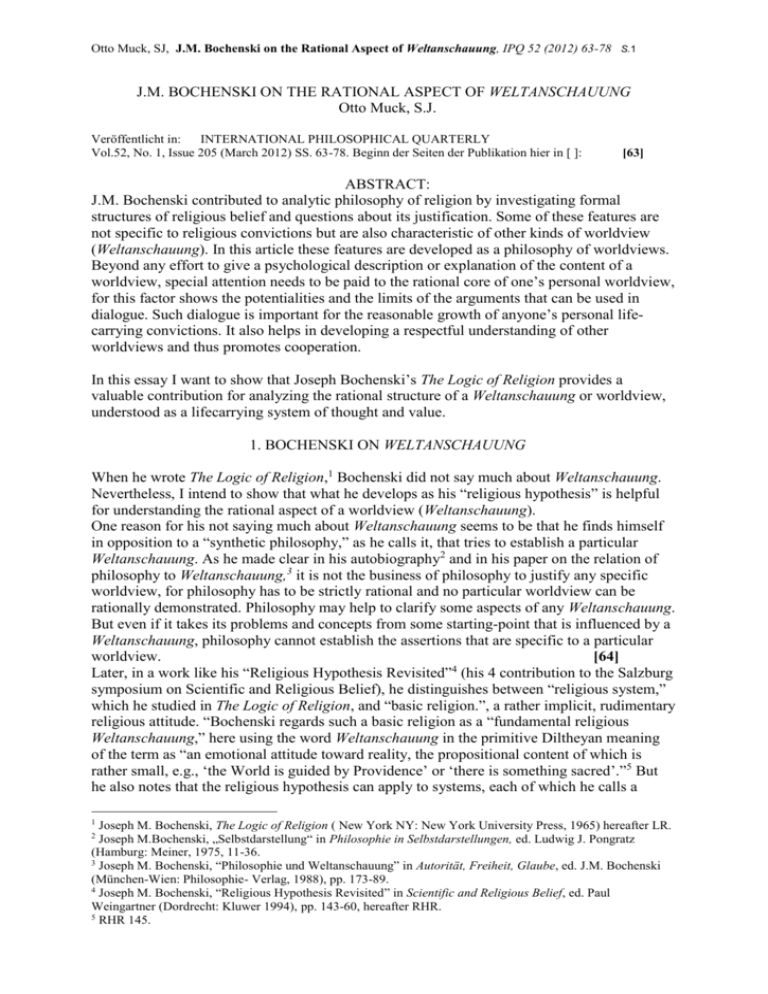
Otto Muck, SJ, J.M. Bochenski on the Rational Aspect of Weltanschauung, IPQ 52 (2012) 63-78 S.1 J.M. BOCHENSKI ON THE RATIONAL ASPECT OF WELTANSCHAUUNG Otto Muck, S.J. Veröffentlicht in: INTERNATIONAL PHILOSOPHICAL QUARTERLY Vol.52, No. 1, Issue 205 (March 2012) SS. 63-78. Beginn der Seiten der Publikation hier in [ ]: [63] ABSTRACT: J.M. Bochenski contributed to analytic philosophy of religion by investigating formal structures of religious belief and questions about its justification. Some of these features are not specific to religious convictions but are also characteristic of other kinds of worldview (Weltanschauung). In this article these features are developed as a philosophy of worldviews. Beyond any effort to give a psychological description or explanation of the content of a worldview, special attention needs to be paid to the rational core of one’s personal worldview, for this factor shows the potentialities and the limits of the arguments that can be used in dialogue. Such dialogue is important for the reasonable growth of anyone’s personal lifecarrying convictions. It also helps in developing a respectful understanding of other worldviews and thus promotes cooperation. In this essay I want to show that Joseph Bochenski’s The Logic of Religion provides a valuable contribution for analyzing the rational structure of a Weltanschauung or worldview, understood as a lifecarrying system of thought and value. 1. BOCHENSKI ON WELTANSCHAUUNG When he wrote The Logic of Religion,1 Bochenski did not say much about Weltanschauung. Nevertheless, I intend to show that what he develops as his “religious hypothesis” is helpful for understanding the rational aspect of a worldview (Weltanschauung). One reason for his not saying much about Weltanschauung seems to be that he finds himself in opposition to a “synthetic philosophy,” as he calls it, that tries to establish a particular Weltanschauung. As he made clear in his autobiography2 and in his paper on the relation of philosophy to Weltanschauung,3 it is not the business of philosophy to justify any specific worldview, for philosophy has to be strictly rational and no particular worldview can be rationally demonstrated. Philosophy may help to clarify some aspects of any Weltanschauung. But even if it takes its problems and concepts from some starting-point that is influenced by a Weltanschauung, philosophy cannot establish the assertions that are specific to a particular worldview. [64] Later, in a work like his “Religious Hypothesis Revisited”4 (his 4 contribution to the Salzburg symposium on Scientific and Religious Belief), he distinguishes between “religious system,” which he studied in The Logic of Religion, and “basic religion.”, a rather implicit, rudimentary religious attitude. “Bochenski regards such a basic religion as a “fundamental religious Weltanschauung,” here using the word Weltanschauung in the primitive Diltheyan meaning of the term as “an emotional attitude toward reality, the propositional content of which is rather small, e.g., ‘the World is guided by Providence’ or ‘there is something sacred’.”5 But he also notes that the religious hypothesis can apply to systems, each of which he calls a 1 Joseph M. Bochenski, The Logic of Religion ( New York NY: New York University Press, 1965) hereafter LR. Joseph M.Bochenski, „Selbstdarstellung“ in Philosophie in Selbstdarstellungen, ed. Ludwig J. Pongratz (Hamburg: Meiner, 1975, 11-36. 3 Joseph M. Bochenski, “Philosophie und Weltanschauung” in Autorität, Freiheit, Glaube, ed. J.M. Bochenski (München-Wien: Philosophie- Verlag, 1988), pp. 173-89. 4 Joseph M. Bochenski, “Religious Hypothesis Revisited” in Scientific and Religious Belief, ed. Paul Weingartner (Dordrecht: Kluwer 1994), pp. 143-60, hereafter RHR. 5 RHR 145. 2 Otto Muck, SJ, J.M. Bochenski on the Rational Aspect of Weltanschauung, IPQ 52 (2012) 63-78 S.2 Weltanschauung, here meaning by that term “a complex, sometimes even sophisticated system like those of Communism and of National Socialism.”6 This is one reason why I think that it is appropriate to view his investigations of the logic of religion and especially his religious hypothesis as relevant for the investigation of the rational structure of a Weltanschauung. It should be kept in mind that the point is not to validate a particular worldview but to clarify some of the features of any worldview, for this analysis shows how a use of arguments can help to develop worldviews in a reasonable way. Accordingly, I want to consider Bochenski’s ideas in the context of the discussion of Weltanschauung. 2. TOWARDS A PHILOSOPHY OF WORLDVIEWS (1) A requirement for the philosophy of religion. Before the end of last century, the investigation into the rational contents of any Weltanschauung has once again attracted attention. One reason seems to be an awareness of the plurality of worldviews and the desire for a better understanding of their differences. It can also be seen as a contribution to philosophy of religion7 if one views religious systems or even basic religion as examples of Weltanschauung and therefore susceptible to the results of an analysis of the notion of Weltanschauung. In his essay “The Philosophy of Worldviews” Ninian Smart formulates it in this way: Religions and ideologies both guide men regarding the meaning of life.... It would seem that the opening out of the philosophy of religion to theologies and religions itself pushes us onward in the direction of an even more plural range -- the range of both religions and ideologies, the range of existential worldviews as they might jointly be called. In parenthesis: it is a great shame that there is no simple word for such Weltanschauungen -- sasanas, darsânas, margas are suggested by India, and other cultures could supply other terms. The briefest, least bad English word seems to me to be “worldview.”8 [65] He even suggests the neologism “biodoxy,” which is reminiscent of the German word Lebensauffassung, but this way of putting it seems to stress too much the practical aspect while “worldview” accentuates the theoretical, as expressed by the German word Weltbild. Nevertheless, both aspects are to be taken into account: The philosophy of worldviews reminds one how much the practical and the theoretical are interwoven in men’s systems of belief, in a way which leads to a gap between epistemology and commitment: that is between the softness of evidence and the deep meaning of movement and tradition.... Furthermore, as philosophy of worldviews wrestles with the analysis of myth and of that charged facticity which somehow bridges the gap between object and feeling, it will increasingly remind us of the symbolic character of so much human belief and action.9 In his discussion of the notion of worldview, H. Benesch10 distinguishes a personal worldview from explicit systems and also from the commonly accepted convictions in a society, e.g., commonly held beliefs or shared standards for accepting propositions or values. Nevertheless, the personal worldview is in tension with public systems and is the product of coming to terms with them. 6 Ibid. Patrick Riordan, “Religion as Weltanschauung,” Aquinas 37 (1991): 519-34. 8 Ninian Smart, “The Philosophy of Worldviews” in Contemporary Classics in Philosophy of Religion, ed. Ann Loades (LaSalle IL: Open Court 1991), pp. 491-506, here at p. 493. 9 Ibid., p. 505-06. 10 Hellmuth Benesch, Warum Weltanschauung (Frankfurt a.M.: Fischer 1990). 7 Otto Muck, SJ, J.M. Bochenski on the Rational Aspect of Weltanschauung, IPQ 52 (2012) 63-78 S.3 (2) Worldview as a personal conviction. In his article on the topic, G. D. Kaufman examines the meaning of the word “God” in the context of a basic attitude towards life: “Any being, as speaking and acting, has a symbolic representation of its environment, with an evaluation of it relevant for decision and action.”11 I understand this text as suggesting an operational definition. He takes “worldview” to mean the conviction and attitude of a person as it affects the shaping of his or her life. In this sense, everyone has a worldview, for he uses the term precisely to designate that set of attitudes on which one’s life is based. More precisely, this will be a personal worldview. To say this is not to deny that there are differences in the content of the worldviews of different people, and even differences between the worldviews of any one person at different times, especially if one shows a willingness to examine and to develop them. By definition, a personal worldview is thus the basis for a person’s action. It can also be the basis for an explicit formulation of this attitude. But, of course, any attempt at its explicit formulation can be more or less adequate as a presentation of the lived worldview. It is not always regarded as valuable within a lived worldview to have an explicit formulation of it. The explicit formulation can contribute to the development of one’s lived worldview in the course of one’s life, but it is also conceivable for it to lag behind. One task of the philosophy of worldviews can be the clarification of this tension and the problems that arise in the development of a personal worldview. When Bochenski calls basic religion a Weltanschauung, he seems to mean the content of a particular lived worldview. But in my opinion, the implicit character of [66] the lived worldview does not rule out an attempt to interpret it and to try a reconstruction in an explicit form. Such a reconstruction seems to me to be the approach that Bochenski has taken to the study of the logical structure of religion. (3) Worldview as an explicit system. Often one speaks of a “worldview” as a system of statements about the structure of the world, and especially the structure of humankind’s role and the meaning of life. Such a system is something explicitly articulated. Usually there is some group of people who believe these statements to be true, or at least regard them as important for their personal outlook on life. Examples for such systems may be the worldviews of Marxism or National Socialism, but also a Christliche Weltanschauung. The use of the word Weltanschauung for the ideologies of dogmatic and dictatorial systems has burdened the use of the word and contributed to a narrowing of the analysis of worldview to a critique of ideologies. Accordingly, some critics see the value of a scholarly analysis of forms of worldview in their psychological and sociological explanations for what these philosophers perceive as cognitively meaningless statements by which they pretend to express some deeper view of reality.12 Instead of pretending to justify norms by appealing to such a view of reality that in fact is only a projection of already adopted values, they should rather confess openly that they have made up their minds to adopt these values. By this admission, better dialogue would become possible, whereas attempts to assert a foundation for their norms and values in what is only their own projection (misunderstood as reality) only fosters intolerance. In spite of the fact that Bochenski thinks that philosophy is not able to justify any particular worldview, his special emphasis lies on the aspect of justification: “Up until now, logicians and analytical philosophers of religion have mostly concentrated on semantic problems; little work has been Gordon D. Kaufman, “On the Meaning of ‘God’,” Harvard Theological Review 59 (1966): 105-32, here at pp. 109-11. 12 As an example for this approach, see Ernst Topitsch, Vom Ursprung und Ende der Metaphysik (Wien: Springer 1958). 11 Otto Muck, SJ, J.M. Bochenski on the Rational Aspect of Weltanschauung, IPQ 52 (2012) 63-78 S.4 done about questions concerning the structure and justification of faiths.”13 He approaches the justification of the objective faith of any religion by his religious hypothesis, and he also applies this approach to worldviews. Doing so permits him to show how, by explaining the rational core of a worldview, it is possible to accept a worldview as reasonable even if it is not possible for philosophy to validate a particular worldview as definitive and compelling for everyone. 3. CLUES IN THE RELIGIOUS HYPOTHESIS TO THE ANALYSIS OF WORLDVIEWS In “The Religious Hypothesis Revisited” Bochenski reaffirms the essentials of his understanding of the religious hypothesis and adds modifications only on some points.14 He formulates the essentials of the religious hypothesis as a way to justify a religion in this way: [67] The religious hypothesis [a] orders [b] the whole of the believer’s experience [c] -- not only factual propositions, but also value-propositions. There are, consequently, two differences between it and a scientific hypothesis. First its utter generality; second, the fact that it is not intersubjectively verifiable, among other reasons because it also covers the said value propositions. It is also distinct from faith [d], as it lacks certainty, which is proper to every authentic religious faith.15 Let me now comment on the points a-d, using material from The Logic of Religion (especially pp. 148-50) and then indicate how some questions concerning points a and b can be further clarified by considering the philosophy of religion. (a) The content of the religious hypothesis. The content of the hypothesis is the basic dogma of a religion. As a basic assumption, it states that all sentences singled out by the heuristic rules of a given religion are true with the probability 1.16 These sentences are 16 about the object of religion and express its “objective faith.” Here it will be useful to recall the structure of an objective faith, something that Bochenski studied in the earlier chapters of The Logic of Religion (especially pp. 59-65, 68-82). As in the sciences, the sentences belonging to an objective faith may be systematized in different ways by using only sentences belonging to the objective faith or formulating axioms with or without terms and sentences of profane (non-religious) language. The different ways that believers have of making sense of their faith are expressed in different types of axiomatization. The religious hypothesis that a person thus forms takes the basic dogma of that religion as a metalogic assumption. According to this assumption the objective faith is accepted as true. This leads to an explanation that makes use of the much differentiated content of faith as understood by that person, in relation to the other forms of knowledge. So, Bochenski uses the analogy to an explanation in science for two tasks. One is the ordering of the objective faith, eventually including profane language, in the person’s total discourse, thereby forming the content of a religious worldview. The other application of this analogy is the test of the religious hypothesis with its content as an explanation of the total experience of the person. (b) Explanation by the religious hypothesis. In the religious hypothesis the basic dogma of the religion concerned is considered as explanatory, for the sentences accepted to be true in virtue 13 RHR 149. RHR 149. 15 RHR 149. 16 LR 61. 14 Otto Muck, SJ, J.M. Bochenski on the Rational Aspect of Weltanschauung, IPQ 52 (2012) 63-78 S.5 of it are used to explain the experience of the person who makes the hypothesis. Hypothetically accepted, it has the same content as the act of faith, but differs psychologically from it by being taken not as certain (that is, with probability 1), but as an explanatory sentence. As an explanation, it has a function similar to that of such sentences in the reductive sciences. In The Logic of Religion Bochenski still thinks that the similarity holds in both aspects: “The starting point is experimentally established sentences. The hypothesis is of such a nature that they may be deduced from it; it permits predictions and can be verified by new experimental sentences deduced from it.”17 [68] Later, however, Bochenski recognizes that a religious hypothesis differs from a scientific hypothesis in not allowing forecasts.18 A common feature for a hypothesis in different fields is that “it refers to a sentence which explains, i.e., orders propositions of a certain field. And the religious hypothesis certainly does that.” In the case of religion, “it has nevertheless a high practical value, as it always includes a code of behavior.” We will have to return to the topic of the ordering function of explanation later. (c) The explanandum of the religious hypothesis. The explanatory relation of the hypothesis differs from explanation in the sciences especially in the following two points concerning the explanandum. First, the basis of empirical sentences comprehends not only a subclass of sentences reporting experiences recognized by the subject as proper to one or more of the sciences, but all the sentences accepted by the subject, that is, this person’s “total experience.” Second, the basis includes not only sentences about facts but also “sentences on moral and aesthetic values,” which therefore have a direct relevance to action. In The Logic of Religion Bochenski tends to accept as a function of the explanation the coordination of factual and value sentences. But this does not seem to permit predictions. The investigation of the logical structure of this explanation has, according to Bochenski, not yet been done. To regard only factual sentences as an explanandum was, rather, a prescientific function of less developed forms of religion. To see only value sentences as the explanandum would be consistent with theories of religion that emphasize only the ethical impact of religious language. But, according to Bochenski, this is empirically inadequate to the known objective faith of religions. To see religious experience as the explanandum raises not a logical objection but an empirical one. In The Logic of Religion he is very skeptical about religious experience, if this is not taken as understanding common experience in the context of an explanation along the lines of a religious hypothesis. But in “The Religious Hypothesis Revisited” Bochenski shows a more sympathetic attitude towards religious experience and therefore admits that, given something like religious experience, it should above all belong to the explanandum of the the religious hypothesis.19 (d) The religious hypothesis as a justification of faith. With regard to the justification of faith, an explanation by the religious hypothesis pertains to the situation in which a person begins to consider that “if he does accept the basic dogma of a certain religion, then the whole of his experience will become organized and somewhat explained.”20 Bochenski says that this is what others express by saying that it “gives meaning to the world and to existence.” In the formal way it means that “the religious hypothesis plays the role of an axiom out of which the remainder is thought to be deduced (with the help of other sentences, of course).”21 The consideration of various other experimental sentences accepted by the subject serves as verification. [69] 17 LR 148. RHR 148f. 19 RHR 145-47. 20 LR 149. 21 Ibid. 18 Otto Muck, SJ, J.M. Bochenski on the Rational Aspect of Weltanschauung, IPQ 52 (2012) 63-78 S.6 The differences between the total experience of two persons explain why such a hypothesis may be quite plausible to one person but need not appear plausible to the other. The extreme generality of the hypothesis explains its solidity, its resistance to falsification. For Bochenski, it is a trivial truth that “the more general an explanatory sentence is, the more falsification it can take without being overthrown.”22 In The Logic of Religion Bochenski also discusses inconsistencies in the use of religious sentences.23 He sees in such inconsistencies an opportunity to scrutinize one’s assumptions. The general methodological approach for overcoming contradictions resides in a linguistic analysis of the terms used and in an inquiry into the correctness of the assumptions made, logical and otherwise. This leads to a distinction between fields of language with different epistemic status. So, according to Bochenski, the sentences of an objective faith have the highest probability for a believer, in virtue of his acceptance of its basic dogma. But the understanding of these sentences, articulated by an acclimatization, has a lower probability, depending on what Bochenski sees as the mostly inductive rules of derivation and their correct application. For the total discourse of a believer, its validity is dependent also on sentences from other fields such as profane sciences with their different grades of probability. In “The Religious Hypothesis Revisited” Bochenski adds the distinction between religious system and basic religion, which he takes as a rudimentary form of worldview.24 Here the question arises whether such a basic religion is a prerequisite for a religious hypothesis to justify a special religious system. Furthermore, it is not clear, if the basic religion can be justified in a way similar to the religious hypothesis. 4. EXPLANATION AND THE EXPERIENTIAL FEATURES OF WORLDVIEWS The Logic of Religion was one of several contributions to the analysis of religious language that appeared around the same time. This literature succeeded in clarifying many important features of religion and of worldview. This is also a reason why Bochenski’s logical investigation of religion can be regarded as a contribution to the analysis of the rational structure of worldviews. But this discussion can also contribute to solving such problems as the kind of explanation that is used in the religious hypothesis. (1) Different ways of looking at things. The critique of religious language25 by A. Ayer26 and B. Russell27 was a standard position of logical empiricism. The [70] discussion was brought to a new stage with the parable of the invisible gardener presented in “New Essays in Philosophical Theology.”28 Here R. M. Hare introduced the concept “blik” to indicate the special attitude that one uses in dealing with various questions of everyday life. When differences arise between descriptions of the same empirically given situation, these differences can be traced to the various “bliks” of the observers. We make use of such “bliks” throughout our lives, and even when we devote particular attention to experiences as such, some “blik” is operative. 22 LR 150. LR 82-87. 24 RHR 144f. 25 Various contributions to this discussion are presented in Frederick Ferré, Language, Logic and God (New York NY: Harper, 1961). A report of the discussion and a relation to the concept of Weltanschauung and to Bochenski’s The Logic of Religion is to be found in Otto Muck, “Zur Logik der Rede von Gott,” Zeitschrift für katholische Theologie 89 (1967): 1-28. 26 Alfred J. Ayer, Language, Truth and Logic (London UK: V. Gollancz, 1946) pp. 114-20. 27 E.g., Bertrand Russell and F. C. Copleston, S.J., “A Debate on the Existence of God” in The Existence of God, ed. John Hick (New York NY: Macmillan, 1964), pp. 167-91. 28 Anthony Flew, ed., New Essays in Philosophical Theology (London UK: SCM Press, 1963). 23 Otto Muck, SJ, J.M. Bochenski on the Rational Aspect of Weltanschauung, IPQ 52 (2012) 63-78 S.7 (2). Its relevance for mutual understanding and cooperation. Paul M. van Buren29 tried to interpret the Christian message as an expression of a “blik” induced by the provocation of the person Jesus Christ. Religious language serves to express this “blik” so as to encourage others to adopt it also and to give people an understanding of the motives for their way of acting and living. So, an important dimension of religious language is its convictional character, as W.F. Zuurdeeg30 among other has pointed out. Accordingly, successful communication in dialogue depends on the extent to which the partners succeeded in becoming aware of the various convictions and motivations of the other participants. Here personal arguments, i.e., arguments with a premise whose acceptance is not shared have their function in making the differences explicit. We can conclude that it is important to pay attention to the personal character of an attitude and conviction that is expressed in religious language. This conclusion is applicable to many different contexts of human interaction. Thomas F. Torrance31 emphasizes that in 31 all our philosophy we make use of our prior understandings of the world and of life. Not to take this fact into account leads to a dogmatic philosophy while awareness of such a presupposition helps to be more critical concerning its influence. (3) The impact of symbols and organizing images. But is religious language only an expression of a subjective attitude? According to I.T. Ramsey,32 experience is very important, but a special kind of experience that he calls “disclosure.” Rather than being a neutral sort of description, it draws attention to something that one grasps in a personal encounter. It is a kind of intuition of unfamiliar relations and aspects of the familiar objects of common experience. Sometimes these relations have a very wide -- even all embracing -- scope. They may therefore be called “cosmic disclosure.” If a personal dimension is an essential part of it, it may well be called “religious disclosure.” Religious language essentially tries to express the content of such disclosures. For this purpose, it has to use ordinary language. It uses familiar relations as “models” that have to be transformed by appropriate “qualifiers” in order to point to the content of the disclosure. [71] Here too religious language is seen as connected with an understanding of life and world that motivates one to make an evaluation of the action to be taken. Some see the special verbal forms and pictures used to express it as “organizing images” that help to give orientation to the manifold experiences of life. The personal character of these symbols is stressed by F. Ferré when he calls them “responsive symbols” in contrast to symbols that have an emotionally reactive meaning.33 These symbols are responsive in so far as they exercise their organizing function only if they are personally accepted. They do not work by mere association. (4) The relevance of experience for religious language. These different positions attribute various roles to experience. The content of religious language is not directly verifiable by common experience; rather, it serves the function of organizing experience and of ordering it with regard to its relevance for human life. I want to call this an “integrating function” since it serves to integrate all that a person experiences and all the person has to deal with into the whole of the person's life. If this integrating content is grasped by a disclosure, one might see in it a kind of “religious experience.” Important here is that the person involved is open for a consideration that does not exclude vital questions of human life and in this sense can adopt 29 Paul M. van Buren, The Secular Meaning of the Gospel (London UK: SCM Press, 1963), pp. 105f. Willem F 30 . Zuurdeeg, “The Nature of Theological Language,” The Journal of Religion 40 (1960): 1-8. Thomas F. Torrance, “Faith and Philosophy,” The Hibbert Journal 47 (1948): 237-46 32 Ian T. Ramsey, Christian Discourse (London UK: Oxford Univ. Press, 1965). 33 Ferré, pp. 145, 159f. 30 31 Otto Muck, SJ, J.M. Bochenski on the Rational Aspect of Weltanschauung, IPQ 52 (2012) 63-78 S.8 an “all embracing” viewpoint that transcends the borderlines of methodically limited viewpoints. One might call this aspect of religious discourse “transcending experience.” Finally, to express the content of such a religious disclosure, one needs an experiential familiarity with the models and the ways of modifying them by suitable qualifiers. A psychological investigation into types of worldviews stresses the influential role of models. The ordering function of the “organizing images” is not limited to common experience but is also comprised of personal experience, including values. This is the reason why, e.g., a religious content like belief in God may be challenged by the problem of evil. (5) Explanation as ordering of beliefs. W. Donald Hudson develops the concept of the “rational system of belief”34 as a kind of common standard for accepting assertions and norms. He explains: This system consists of certain propositions and certain principles. These propositions and principles have two features in virtue of which they belong to the rational system. First, they regulate what it makes sense to say or do, and second, general assent is given to them in our society.35 Hudson compares this rational system of beliefs with the function of a world-picture (Weltbild) according to Wittgenstein when he writes: “Wittgenstein (On Certainty) recognized that Moore had called attention to a special kind of proposition which plays a 'peculiar logical role' in our thinking (§136).” But Hudson also points out [72] that for Wittgenstein propositions of this kind are “‘anchored in all my questions and answers, so anchored that I cannot touch' them (§103).” Some propositions are so fundamental to our worldview that we cannot form a conception of what would count as evidence against -- or even for -- them: “One example of such propositions which Wittgenstein gave is that things do not disappear when no one is observing them (§119).”36 This example is reminiscent of the example for a transcendental argument in Strawson’s Individuals37 for presuppositions that are made in language. Stephan Körner has developed this point further in his concept of a “categorial framework.”38 Körner tries to investigate and 38 articulate the general structure and function of such frameworks. They consist of the presuppositions made by people living, speaking and acting in a public world. Körner, of course, is primarily interested in the fact that some of the supreme principles and categories that are accepted by human beings are things that they regard as fundamental and that stand to other propositions in a core-toperiphery relation. To determine the precise status of these nonempirical statements, e.g., whether they have to be regarded as synthetic a priori in Kant's sense (or some modified version of it) or as somewhat disguised analytic statements, is for Körner a further and more difficult question. It is interesting that Körner, using the core-to-periphery relation, pays attention to an “epistemic stratification of the beliefs” of a person. If, for instance, a belief belonging to the higher level is inconsistent with a belief that belongs to a lower level, the person rejects the latter and preserves the former. The beliefs of the highest level are then regarded as ontologically necessary: “To accept a principle as supreme is on the one hand to accept the principle as one accepts any proposition...; on the other hand, to accept the requirement that any belief which is inconsistent with the principle be rejected.”39 Thus, what is in coherence W. Donald Hudson, “The Rational System of Beliefs” in Loades, pp. 33-58. Hudson, p. 35. 36 Ibid. 37 Peter Frederick Strawson, Individuals (London UK: Methuen 1959, reprint 1965), pp. 19-30. 38 Stephan Körner, Categorial Frameworks (Oxford UK: Blackwell, 1970); later developed in his Metaphysics, Its Structure and Function (Cambridge UK: Univ. Press, 1984). 39 Körner, Metaphysics, pp. 9-11, 16. 34 35 Otto Muck, SJ, J.M. Bochenski on the Rational Aspect of Weltanschauung, IPQ 52 (2012) 63-78 S.9 with the principles and statements of the highest level is regarded by the person concerned as a valid judgement about what there is. This is similar to K. Lehrer’s view of personal acceptance when he writes: “Coherence with an acceptance system and, therefore, justification, or better put, personal justification in terms of my acceptance system, results when all the competitors, all the skeptical objections can be beaten or neutralized in terms of my acceptance systems.”40 However, it must be remembered that Körner's categorial framework is presupposing the immanent metaphysics of a publicly apprehended world. Besides that, he speaks of a “transcendent metaphysics” that covers the personal opinion that one has concerning a transcendent reality, if there is one, which is not accessible to perception and public knowledge. This would also be part of a worldview. [73] There arises the problem that usually what is held as part of a worldview is taken as true, notwithstanding the fact that this worldview is not commonly accepted. There seems to be an imminent risk of intolerance. Or must avoidance of intolerance lead to a relativism that is not interested in truth? The work of Körner is designed to find a solution to this problem. Figures like G.D. Kaufman41 show ways in which it can and should become an essential part of a worldview to keep it open for revision and to develop it continually. There is possible a reflective moment of consciousness that allows for an “awareness both that symbolic meaning is indispensable to human life and that every actual structure of meaning is humanly created and must be subjected regularly to scrutiny and criticism.... The reflective moment of consciousness is as much a function of the dialectical structure of certain idealizing symbols as it is of the degree of sophistication possessed by some groups or individuals.... Symbols of this sort...manifest a continual strain toward self-transcendence -- a feature of great importance to human life, since it keeps these symbols (and lives oriented by them) open to new experience and to unanticipated possibilities.”42 It is precisely the quest for truth 42 that stimulates the interest in the rational structure of worldviews. 5. THE IMPACT ON THE ANALYSIS OF WORLDVIEWS I think that these considerations about religious language can help to clarify the kind of explanation and rational structure of a worldview. What then is specific in the elements relevant for understanding religious language and which features may be regarded as common to worldviews, be they religious or not? (1) Explanation as “ordering the experience.” Specific to religious language is religious experience in the form of a religious disclosure. But not specific is a disclosure that gives an awareness of relations that interpret a very wide (if not all-embracing) range of facts and values in human life. Such cosmic disclosures and corresponding organizing images seem not to be specific to religions but also applicable to worldviews in general. The same holds then for the models and their qualification that are required to speak about these relations, which then represent the core of a worldview. Another specific element of religious language, according to Bochenski’s analysis, is the formulation of the essential content of religion as objective faith by heuristic rules and the basic dogma of the religion, according to which the sentences singled out by the heuristic rule are personally accepted and taken as true. In some cases, there might occur a similar situation by a relation to an accepted authority. This point seems to apply to the acceptance of worldviews as compact systems. In other cases, it is more difficult to determine the core of the worldview. From the more general viewpoint, the relation of a religious faith or of another Keith Lehrer. “Knowledge, Faith and Skepticism” in Weingartner, pp. 1-13, here p. 6. Gordon D. Kaufman, “Mystery, Critical Consciousness, and Faith” in Loades, pp. 377-93. 42 Kaufman, p. 387. 42 Ibid., 387. 40 41 Otto Muck, SJ, J.M. Bochenski on the Rational Aspect of Weltanschauung, IPQ 52 (2012) 63-78 S.10 system to a basic authority has to be seen as a specific feature of the core of that [74] worldview. Therefore, for Bochenski, the religious hypothesis tests the assumption of the basic dogma, with its consequences for the objective faith, as explaining the total experience. It follows that the way in which the core of a worldview is determined and structured differs between religions and other worldviews. But for personally accepted worldviews, having a common structure remains the requirement if the core of the worldview is to explain the total experience of the person. As we have seen, this explanation has to fulfill an integrating function. In using the idea of a stratification of our beliefs (as also indicated by Körner and Lehrer), such an integrative explanation43 has to fulfill the following tasks: (a) It must mark the different realms that have to be distinguished but it does not remove the need for an examination and analysis in these realms. (b) It does not make predictions beyond saying that there will appear contradictions, inconsistencies, if the distinction of the realms is ignored. (c) It draws attention to constraints (Brückenprinzipien, some would call them) between items of the various realms -- especially also between facts and values or norms. (d) It may use an articulation by means of typical examples (models), where these relations between the realms can be seen to be instantiated. Another specialty of religion seems to be the fact, that the core of the worldview is not invented by the person concerned but taken from others who, e.g., give testimony of the religious faith. But as in other cases of worldview, one has to take into account that many elements are not framed anew but taken out of the traditions of the culture or from other persons. In many cases one becomes aware of the fact that one already has and lives a worldview when one is confronted with questions that concern this worldview. But the interesting point for a philosophy of worldviews is the investigation of the further development of such a worldview and the analysis of cases in which the development is not only an object of psychological explanation but of rational reconstruction. (2) The validity and reasonableness of accepting a worldview. In regard to the justification for accepting the religious system of an objective faith, Bochenski pays attention to the following points: (a) The objective faith of a religion cannot be deduced from the commonly accepted knowledge. (b) Many people are concerned with a reasonableness of their faith. (c) There remains a gap between the certitude attributed to the faith by a believer and the probability by which the religious hypothesis can be established. (d) In showing the reasonableness of faith by the religious hypothesis, Bochenski observes various similarities and differences with respect to the justification of a hypothesis in science. He adopts an approach that he also has used in the question of meaning with respect to the principle of verification. He sees the similarities rooted in a more general form of methodological postulate and the differences conditioned by the application of this postulate in different fields. In “The Religious Hypothesis Revisited” he shows this point concerning the different function of explanation in sciences and religion. (e) The structure of reasonableness of a [75] faith is corroborated by the account that believers give of their attitude towards faith. (f) When in his later writing Bochenski assumes that the religious hypothesis is preceded by a basic religion, he seems to take into account that the search for reasons presupposes as its background some worldview that one wants to develop by reflection. Are these points specific for a religious hypothesis or do they embody elements relevant for worldviews in general? Regarding (a), it seems to be generally admitted that a concrete personal worldview cannot be deduced. Among other things, he mention the personal character of the total experience and the value statements to be covered by the explanation expected from a worldview. (b) In spite of a widespread skepticism concerning the rationality Cf. Otto Muck, “Metaphysische Erklärung als ganzheitliches Verfahren“ in Akten des Internationalen Philosophischen Kongress (Wien: Herder 1968), pp. 419-25. 43 Otto Muck, SJ, J.M. Bochenski on the Rational Aspect of Weltanschauung, IPQ 52 (2012) 63-78 S.11 of worldviews, arguments are often given for the position taken. Non-religious worldviews especially claim that they are in conformity with the present standards of rationality and science. So, at least for these worldviews rational justification is assumed. In regard to (c), very often a motive for skepticism concerning not only religious faith but also worldviews in general is that they rely strongly on decision and other factors of a subjective character. Thus, in worldviews also there is a gap between evidence and personal conviction. (d) In my opinion the methodological strategy adopted by Bochenski in his religious hypothesis can be carried over to worldviews in general.44 F.Ferré did the same when he took the four requirements for human knowledge that Alfred North Whitehead had formulated at the beginning of his Process and Reality and applied them to systems like religious faith and worldviews.45 According to Ferré, the four criteria of consistency, coherence in explanation, relation to experience and openness to all relevant experience, are to be taken as necessary conditions. The application of these general criteria has to take into account the specific aim of the inquiry. So, the relation to experience does not have the function of prediction but of integration. Potential openness to experience is required and no relevant experience should be ruled out a priori with regard to the total experience, including values. Regarding (e) we can say that both in biographies charting personal development and in dialogues concerning questions of religion and/or worldviews there are not only psychological motives and historical conditions relevant but also considerations that can be understood as applications of these general criteria. In a dialogue aimed at understanding someone else's view, it is appropriate to put a question if the opinion of one’s partner appears to show contradictions or if it seems to fail to take into consideration some very common and typical human experiences. In a similar way, in biographies, the awareness of such questions helps to understand the intellectual development of a person. (f) The religious hypothesis seems to cope with religious faith as playing the role of a worldview as a system. Such an endeavor is guided by the personal worldview already present. It tends to develop it further in confrontation with the reasons that can be produced in favor for or against it. But [76] this will generally be the case when one reflects upon one’s worldview. The occasion for it may be an encounter with another worldview as well as an awareness of experience that are not well integrated or that clash with what was learned in other fields. This leads to the next point. (3) Typical situations for applying the religious hypothesis. One can easily envision a number of typical situations, such as the following. (a) A person might have a personal worldview for which the acceptance of a religious faith is essential because of some authority. The person might then ask whether the acceptance of his or her faith can stand up to the standards of reasonableness. In The Logic of Religion Bochenski had this in mind when he proposed the religious hypothesis. (b) A person might have some basic religion and then meet some sort of compelling testimony about a particular religion. This would be the case that Bochenski takes into account when in “The Religious Hypothesis Revisited” he discusses cases where there is a basic religion presupposed. (c) A person might have a worldview of his own and then encounter a different one. The person may then come to compare the explanatory force of his own worldview with that of the other person -- or, more correctly, with the way in which he has understood what the other person believes. These three situations should be regarded as mutually related. So, I suggest that the situation for applying a strategy like the religious hypothesis in general to worldviews may be seen in the following way. (a) The first case highlights an intention to reflect upon the reasons for the worldview to be accepted. This is not necessarily a religious one. (b) The second takes up a Otto Muck, “Der Beitrag der Wissenschaftstheorie zur Klärung der Rationalität von Glaube als lebenstragender Überzeugung” in Akten des 8. Internationalen Wittgenstein Symposiums 1983 (Wien: HölderPichler- Tempsky, 1984), pp. 53-56. 45 Ferré, pp. 162f. 44 Otto Muck, SJ, J.M. Bochenski on the Rational Aspect of Weltanschauung, IPQ 52 (2012) 63-78 S.12 situation where someone becomes confronted with a worldview as a system; again, this need not necessarily be religious. Then he may find himself by virtue of his previously accepted worldview motivated to examine the newly encountered worldview in order to see if it gives a more satisfying explanation of his total experience. (c) The third situation starts from a more developed worldview in the acceptance of which the person involved thinks to be reasonably justified. This person is then confronted with another worldview or fragments of it. (4) Applications of the rational structure of a worldview in a dialogue. I think that the situation of a confrontation (real or fictitious) may lead to a dialogue on matters of worldviews or on questions of religious faith. Arguments used in this dialogue should serve first of all for getting a more explicit acquaintance with the positions, reasons, and experiences of the partners in the dialogue. For this purpose personal arguments are often helpful. These arguments may use premises that are not commonly accepted in order to help to make explicit the personal experiences and assumptions of the conversation-partner. Such a dialogue may have several effects: (a) Confirming one’s own position by judging that the reasons that have been brought forth are already taken into account. (b) Developing the position by extending it to new experiences. (c) Correcting it by abandoning some assumptions that have been falsified by the arguments. (d) Changing it dramatically by substituting the core of the worldview by another or by making some change in [77] the hierarchy of the levels, so that what the highest level was before becomes a subordinated one. For such a dialogue the following elements of a rational structure of a worldview can be made more and more explicit: (a) The core of a worldview. The core determines the highest level of sentences that have the force of a universal integration of different fields. Some of the sentences belonging to the core are at least implicitly normative, so that they can serve the function of coordinating facts and values. (b) The relation to a potentially universal total experience. It should cover everything that we encounter and with which we have to deal in everyday life. In spite of the fact that life-experience is personal and unrepeatable for each individual, there are typical experiences about which we can communicate with others, which are referred to in the language of poetry and may be studied with phenomenological method. (c) The classification and stratification of fields of human activity and experience. These are the realms to which the integrating explanation refers. The highest level contains a set of concepts and sentences of a general nature that are taken by the person to be self-evident. They are then used in arguments that try to justify the particular interpretation or view of the world. (d) The postulates of consistency, coherence, relatedness to experience and potentially universal openness of this experience. These general criteria are operative in a worldview and specified by the specific integrating function of the explanation intended. They are not sufficient to provide a commonly accepted concrete worldview. They nevertheless guide a reasonable reconstruction of the process of becoming critically aware of one’s own worldview and that of other persons in reflection and dialogue. 6. CONCLUDING REMARKS Attention to Bochenki’s logical analysis of religious discourse has showed elements that are not specific for religions but for all worldviews, if they are taken as personal life-carrying convictions that have the function to integrate the totality of a person’s concerns. Often one sees the need for dealing with worldviews in describing the contents of such belief-systems or of explaining them psychologically or as ideologies. Bochenski pays special attention to Joseph M. Bochenski, The Logic of Religion (New York NY: New York 1 University Press, 1965), hereafter LR. questions of logical structure and to the justification of such belief systems, though primarily for religions. In their formation one finds the same requirements for rationality that are operative in other human cognitional activities, such as in the sciences. But Otto Muck, SJ, J.M. Bochenski on the Rational Aspect of Weltanschauung, IPQ 52 (2012) 63-78 S.13 they differ in regard to the special aims of the investigation. This was exemplified by the experience to be explained and by the integrating kind of the explanation, for both are specific to the aim of a personal worldview. The rational structure of worldviews explains why no concrete worldview can be established in an interpersonally convincing manner. But this structure does show how arguments can help in reflection and dialogue to improve one’s own worldview, its reasonable acceptance, a mutual understanding of persons with their different worldviews, and a way to find realms of cooperation between them. To develop argumentative structures that can be helpful in such a dialogue can, in my opinion, [78] be seen as a task of metaphysics.46 Thus, Bochenski’s investigation into the logic of religion is a valuable contribution to the philosophy of worldviews. In spite of the differences between personal worldviews and sciences, both have their appropriate access to questions of reasonable acceptance, improvement and interaction. See Otto Muck, “Der Beitrag der transzendentalen Metaphysik zum Verständnis der Rationalität von Weltanschauung,” Zeitschrift für katholische Theologie 133 (2011): 145-58. See also Otto Muck, “The Logical Structure of Transcendental Metaphysics,” International Philosophical Quarterly 9 (1969): 342-62. 46
